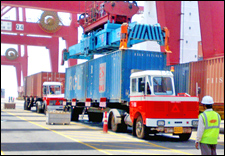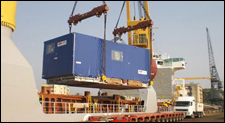 — Adarsh Hegde, Executive Director, Allcargo Logistics Ltd
— Adarsh Hegde, Executive Director, Allcargo Logistics Ltd
Allcargo Logistics Ltd is a leading multinational company providing specialised logistics services across multimodal transport operations, container freight station operations, and project and engineering solutions. Adarsh Hegde successfully established container freight stations in Chennai and Mundra and is in the process of setting up similar facilities at other locations. He discusses India’s logistics and supply chain scenario with Sandeep Menezes.
In what way has the rising supply chain cost combined with increasing consumption put more pressure on logsitics services?
At Allcargo, we believe that increasing consumption is actually a benefit to the logistics sector; it indicates that trading is active and stable. However, what is adding to the increase in cost of servicing is the highly fragmented nature of the industry, the inadequate infrastructure and lack of institutional framework across multimodal transport, complex tax structure etc.
How do you see multimodal transport evolving in India?
After the economic slump in 2008- 09, we saw increased trading activities. Exports increased by 46 per cent and imports by 36 per cent in the April-June 2011 period. If the government continues the thrust and sticks to its commitment of Vision 2020 for Railways and NHDP, and Maritime Agenda 2010-20, then the future for multimodal transport services is optimistic for India.
Besides the trade, increased outsourcing and VAT implementation has also driven the Indian logistic industry. Many multinational companies are outsourcing their logistics services as more and more companies are venturing into the country to source cost-effective raw materials. These raw materials are then transported to the company’s manufacturing hub for assembly and complete formation.
 In India, the transportation costs are high because of the way the supply chains are designed vis-à-vis tax optimisation and not transport optimisation.
In India, the transportation costs are high because of the way the supply chains are designed vis-à-vis tax optimisation and not transport optimisation.
With the federated tax structures we have, every state has its own framework. This has led to companies optimising their supply chains for tax optimisation instead of looking at market optimisation. The introduction of GST will hopefully shift the focus to market-led optimisation, which in turn will ensure that businesses like warehousing and distribution will be able to offer much more value addition than it is today. Managing the right logistics will become a competitive advantage in many industries.
You spoke of inadequate infrastructure and lack of institutional framework across multimodal transport. Can you elaborate on these two issues?
There are issues at two levels: one is the poor infrastructure and other is the lack of institutional structure for multimodal transport.
Studies have shown that in India the average logistics cost is about 10-11 per cent compared to developed economies where it is 6-7 per cent. This shows a clear room for improvement and scope for making us much more competitive. The biggest challenge we have today is the poor infrastructure to support the growing demand. Take ports, for example, the turnaround times in Indian ports is two to five days for a ship, compared to a global average of a single day; this is clearly inefficiency in the system.
There are tremendous delays in awarding port infrastructure contracts because of environmental, dredging or other issues which have severely affected the whole industry and trade. While the environmental and dredging related questions are valid to a certain extent, the model of revenue share is a big question of debate as a lot of domestic and foreign terminal operators and investors are finding this unviable. The policies should be framed wherein the transaction cost ultimately should come down but, in the current scenarios, even the benefits derived from revenue share are not passed onto the end users, and there is no focus on bringing down the transaction cost; this makes the industry uncompetitive.
On the institutional structure, while, individually, rail, road, marine and air have policies, there is no framework for integrated transport services. Logistics is actually a sector with linkages to shipping, finance, commerce and trade, transportation, aviation and railways. The policy framework we have today addresses each of these areas through a different ministry or policy making process.
For logistics as a sector to be successful, grow and help the GDP multiply, it is important to have consistency in the policy across all of these areas. There is an urgent need for an independent agency that can act as a single body or authority to look into all the aspects of policy framing, implementation and other operational and regulatory aspects of the whole logistics sector in alignment with all the stakeholders who are directly or indirectly related to logistics sector, and enable a uniform policy making framework for the industry.
TRAI has been a successful model for telecom, so a similar governing body for logistics would be helpful to look at faster and more real policies and solutions for the industry.
Compared to other developed and developing economies, the Indian logistics industry is less competitive owing to the disparate policy process. We could learn from these nations by taking references from policies which are already implemented successfully rather than reinventing the wheel, frame the same policies by customising it to India context.
 Low quality of existing warehousing assets is resulting in relatively poor return on investment on account of commodity pricing. How can this situation be rectified?
Low quality of existing warehousing assets is resulting in relatively poor return on investment on account of commodity pricing. How can this situation be rectified?
Quality of warehousing assets in India is not primarily an outcome of poor returns on account of rising input commodity prices and, instead, is dependent on several underlying factors.
Firstly, there is no strong governing body that is setting and driving standards on warehouse quality, building norms, warehouse operations, and health and safety codes. The warehouse act of 2007 doesn’t address any of the core issues that would drive standardisation and quality in warehouse infrastructure. The absence of such a policy clearly creates no incentive for warehouse users to comply and hence today sensitivity to warehouse quality is driven primarily by the users own internal standards if any.
If there was a robust policy aimed at warehouse users and LSPs backed by strong enforcement, then users would automatically drive the developers and LSPs to provide warehouses that meet the norms. This would then force LSPs, manufacturers and developers to employ the latest technologies and focus on efficiency to counter the increased costs on compliance.
Simultaneously, if the government quickly rolled out GST and other such policies which would drive efficiency within the supply chain it would counter the increased costs and reduce the burden to the end consumer.
What is your company’s longterm strategy in the Indian logistics market?
At Allcargo, we have always differentiated ourselves by offering superior personalised services with consistency. We have always invested in high quality people who practice organizational values and build state of the art assets. And we have laid great emphasis on building strong business processes, centres of excellence, governance mechanisms, best practices for sustainability and growth over the years.
Our business focus remains in the areas of multimodal transport operations, container freight stations and inland container depots, and project and engineering solutions. We have made investments in our shipping and warehousing & distribution services in the last few years. We continue to focus on our expertise in each of these areas and look at developing our newer offerings more robustly in the future.











